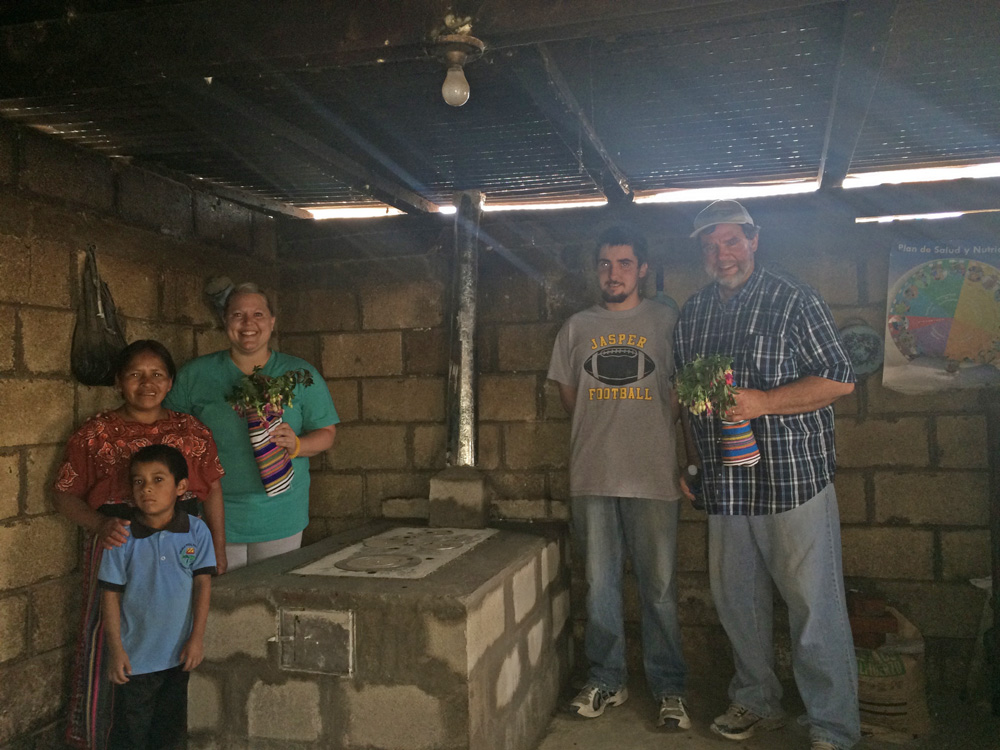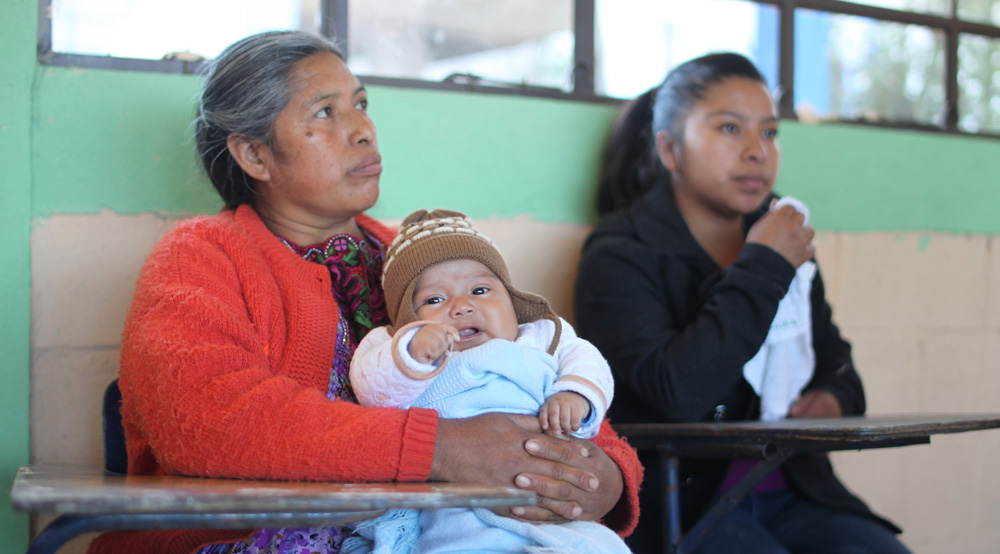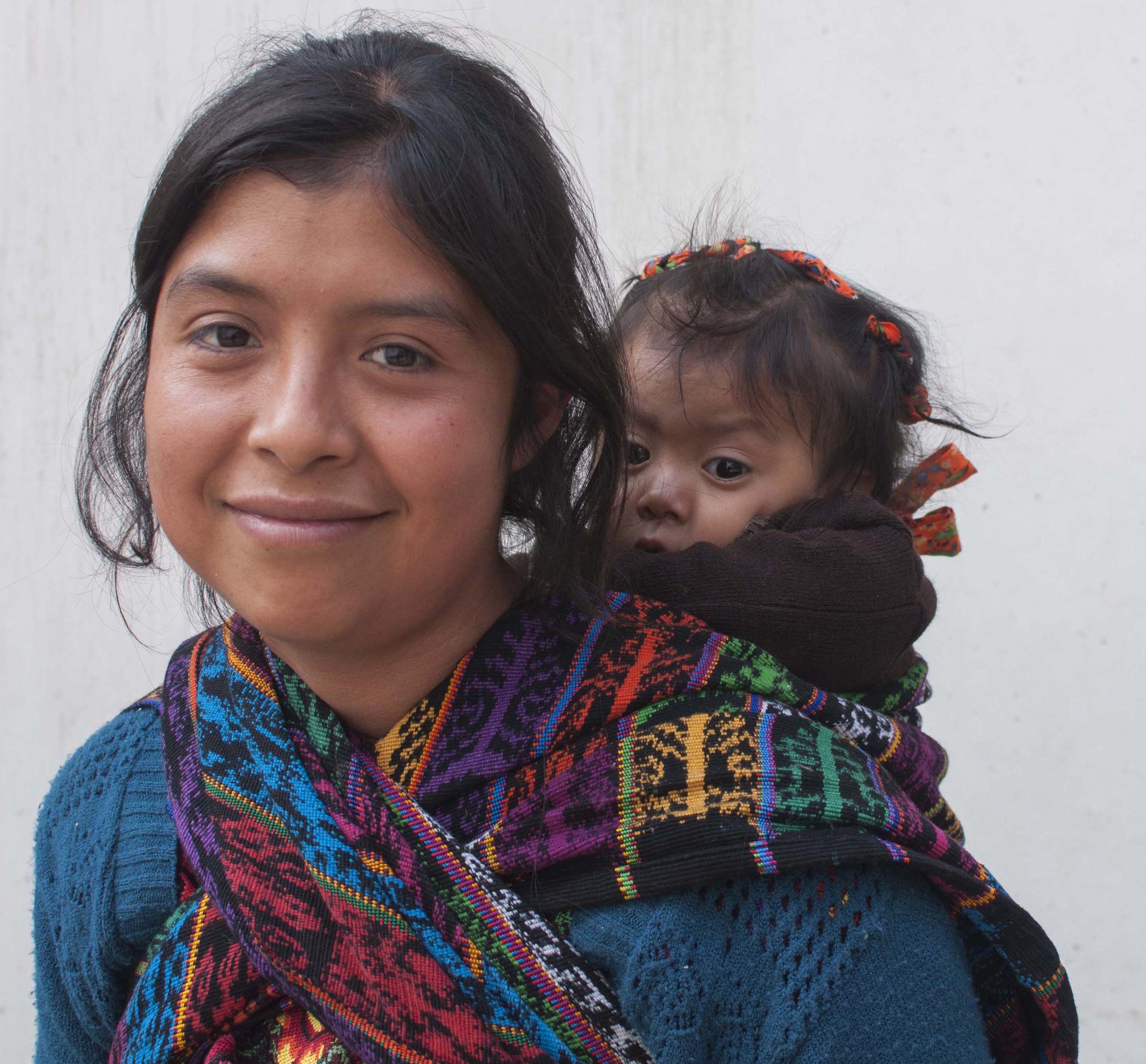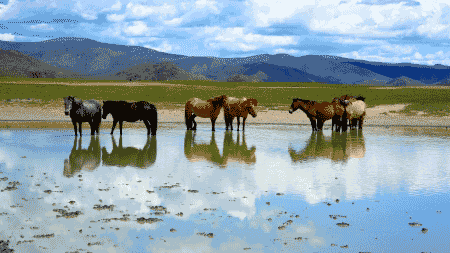HSP summer 2017 teams from Dusty shoes, Aldersgate UMC Church and the Stanton district completed a water tank for the 35 families of Nuevo Chuicutama. The community was facing months without water due to changes in weather patterns and increasing population.
LET'S LEARN FROM THE HERD
HSP Organizes New Partnership for Equine Assisted Therapy
The mission of the Highland Support Project is to foster the growth of social capital that enables people to work together to access opportunities and create a better world. One aspect of this endeavor is promoting the values and norms that permit cooperation and seeking the common good.
Adam Smith, the famed Scottish philosopher and author of the Wealth of Nations, also penned the Theory of Moral Sentiments in which he argues that empathy is the critical natural trait that enables humans to achieve civilization and this mirrors a Maya teaching about the importance of harmony for a healthy society.
“There are striking similarities between horses and people,” says Dede Beasley, M.Ed., LPC, an equine therapist at The Ranch, who grew up riding horses and has maintained a private practice counseling individuals, couples, and families for 30 years. “Like people, horses are social beings whose herd dynamics are remarkably similar to the family system.” (1)
It is not a surprise to those who have had a dog or a horse as a friend to learn that herd animals have developed high levels of emotional intelligence that extend beyond the borders of species. Clinical research confirms that animal therapy benefits include:
- Improved fine motor skills,
- Improved balance
- Increased focus and attention
- Increased self-esteem and ability to care for oneself
- Reduced anxiety, grief, and isolation
- Reduced blood pressure, depression, and risk of heart attack or stroke
- Improved willingness to be involved in a therapeutic program or group activity
- Increased trust, empathy, and teamwork
- Greater self-control
- Enhanced problem-solving skills
- Reduced need for medication
- Improved social skills
Because many children, teens, and adults enjoy working with animals, animal-assisted therapy can be particularly beneficial for individuals who are resistant to treatment or have difficulty accessing their emotions or expressing themselves in talk therapy.(2)
The Highland Support Project has initiated a partnership with the Fort Apache Historical Foundation and the Apache Behavioral Services to develop an Equine Therapy program housed in the historic stables that once housed the rides of the famed Buffaloe Solders.
The objective of the program is to offer culturally relevant, holistic therapy alternatives to a population that presents common indicators of historical trauma.
While we are in the beginning stages of rehabbing the stables and constructing riding corrals, we envision this program to include trail rides and other commercial equine activities that will provide employment and enterprise development opportunities through culturally supportive tourism.
We also identify this as part of the solution to the challenging issue of wild horses and the economic and ecological impact these herds have on tribal lands throughout the Southwest.(3) No ones like to have the well-being of horses in competition with the needs of tribal members. The unfortunate problem arises from the exponential growth of herds where there are no natural predators. We hope to provide a business model capable of maintaining the sacred relationship of Apache people and the Mustang herds.
HSP is organizing work teams starting Spring 2017 to work on the corrals and rehabbing of the stables. We will also have trail development and maintenance opportunities perfect for youth groups. For more information, register here.
(1) 5 Lessons People Can Learn From Horses in Equine Therapy
HSP's 2015 Annual Report
Getting to Know Dilworth UMC
[huge_it_gallery id="9"]
5 hardworking and fun-loving ladies from Dilworth United Methodist Church in Charlotte, North Carolina came to experience rural indigenous life in Guatemala for their 1st mission trip with HSP. The team built 5 stoves in the community of Caserío Belen, San Juan Ostuncalco, and carried out their Maya Arts Project (MAP) in a rural school in the neighboring community of Chanshenel.
During the construction of their stoves, many family members were actively involved with our Dilworth partners and enjoyed helping them mixing cement and carry blocks. One of AMA's women's circle members and current stove beneficiaries was in the middle of having her new house built. She dictated where the future kitchen would be and the stove was built in the open air through rain, cold and wind; but our Dilworth partners were happy as ever to help bring her homeowner's dream alive with the addition of an improved stove.
With only 5 members of the team, the Dilworth ladies bravely led 2 MAP projects to over 100 students, from grades 1-6. It was a busy morning, to say the least. The director of the school commented that the government only gives them about 200 Quetzales per year (approximately $26.00) to buy all of their supplies for the total of 130 students, including those in pre-primary. Because of this, they cannot afford art supplies like paint, glitter, brushes, canvas, etc., that HSP supplies MAP with. The students rarely get to let their creativity shine through elementary art and so they were ecstatic to paint, glue, cut, and play on that special day. The joy and excitement on their faces to learn about their Maya culture through art and creativity was something that warmed all of our hearts and kept us smiling for the rest of the day.
We look forward to continuing our partnership with the loving hearts of Dilworth UMC for another mission trip in the future. Until next time, thanks to our lovely team for choosing to do their summer mission trip through the transformational development model of HSP!
Experiencing the Symmetry of HSP with Shiloh UMC
 According to Mayan cosmovision, we are not seen as separate from our environment but rather we are known to have been created from it. All matter on earth is made up of the same particles as stars, and Maya mythology tells that we first formed into humans as corn growing from the earth.
Just as how we as Highland Partners come to Guatemala to understand and experience another culture, we leave part of ourselves behind. The process is reciprocal, Highland Partners come to initiate sustainable change in rural communities and subsequently are changed internally. The community of Manantial will always see Shiloh’s warmth in the flames of their stoves, and their spirit in the trees planted on their land.
According to Mayan cosmovision, we are not seen as separate from our environment but rather we are known to have been created from it. All matter on earth is made up of the same particles as stars, and Maya mythology tells that we first formed into humans as corn growing from the earth.
Just as how we as Highland Partners come to Guatemala to understand and experience another culture, we leave part of ourselves behind. The process is reciprocal, Highland Partners come to initiate sustainable change in rural communities and subsequently are changed internally. The community of Manantial will always see Shiloh’s warmth in the flames of their stoves, and their spirit in the trees planted on their land.
Thank you, Shiloh UMC for your participation in HSP’s methodology of transformational development that empowers marginalized native communities. You have planted the initial seed of this process for 5 families with a clean-air cook stove and 50 new trees.

Tarrytown UMC- A Week of Adventure and Fulfillment
[huge_it_gallery id="8"]
HSP just finished up a fantastic week of service with Tarrytown United Methodist Church from Austin, Texas, who brought their Youth Group down to Guatemala for their triennial trip with HSP. The team of 32 youth and 14 adults built 15 stoves in the Mam community of El Tizate, San Juan Ostuncalco, which was that community’s first time connecting with Highland Partners. The Tarrytown team planted 150 trees and carried out 4 distinct and unique MAP projects with El Tizate students as well as students from the K'iche village of Pacutama, near our community center in Santa Catarina Ixtahuacán.
Some highlights from our week:
- A small group of dedicated stove-builders decided to continue on to a 3rd day of construction to help the community receive 15 stoves instead of the original 11 planned. 4 more families in El Tizate now benefit from an improved stove!
- After the 2nd round of MAP with the Pacutama students, the day culminated into a spontaneous trash clean-up. The group decided they wanted to put forth some extra effort to tidying up the grounds of the school and a surrounding forest. With a group of 46, they were able to achieve a lot in a short amount of time. The area looked beautiful and the teachers and students were so grateful.
- Two birthdays were celebrated Guatemalan style in Xela. After a Salsa class, the birthday teens were surprised with a room ready with two piñatas and a Mariachi band, complete with delicious cake! Everyone practiced their Salsa moves after the candy was collected.
- On a foggy hike up into the hills of Santa Catarina, 2010 returning partners Brian and David, with the help of social promoter Paola Tzep, took us on a detour to the community of Chiquisis. This was where they first built stoves 6 years ago, and they wanted to revisit the special connections they had made with the place and with the people. We visited a community member named Manuela who was using her 6-year-old stove built by other partners from David and Brian's 2010 team. She was so excited to see them, totally surprised and taken aback to reconnect with Highland Partners from so long ago. When she heard that the visitors names were Brian and David, she began to laugh out loud and told us that those happened to be the names of her two sons!
- At the end of the trip Lupe, co-founder of HSP, made a statement about how being around passionate and excited youth ready to serve is a special feeling for her. It reminds her of when she was a teenager and formed a youth group in her community of Tejutla, with that same young drive and spark to create change. She said that being around excited youth fills her cup with energy and keeps her going.
We are so excited and happy to continue to grow our relationship with our Highland Partners from Tarrytown. We love you all! Thanks for a great week!
New Video About our Midwifery Program
"Midwives not only improve the chance of a safe pregnancy and delivery, but also provide the full continuum of care throughout a woman’s life."
-Isabella Lövin, Sweden's minister of international development cooperation

The International Day of the Midwife on May 5th received major media recognition in TIME magazine, discussing midwifery and its importance in public and women’s health. We’re so happy to see such an important but often marginalized role getting major attention. As awareness increases, we invite those of you who are interested to watch this short clip about the midwifery students in Guatemala that HSP sponsors to achieve an accredited certification after a two-year course.
https://vimeo.com/181538116
The role of the midwife in Maya society has traditionally been revered as the seat of the community and the ultimate source of healing and spiritual knowledge. The Maya K'iche word for midwife is translated to be "Comadre" or "Co-mother," meaning that the midwife is seen as the community's collective mother. Midwives are also general practitioners, attending to pre and post-natal care for mothers but also prevention and treatment of common illness. Midwives have always helped bring communities together and are especially valuable in current Guatemalan society as they provide a local health service to rural and indigenous women who often do not have the means to travel to or pay for visits to local hospitals.

Learn more about our programming or read personal statements by the students about their passion for becoming midwives
As stated by an article in Deutsche Welle, “Giving birth in a developing nation is not an easy thing. Approximately 287,000 women worldwide die every year due to complications related to pregnancy and childbirth, and 2.9 million newborns die in the first month of life. Most of these often preventable deaths occur in low-income countries and in rural areas, according to the WHO. That's why the World Health Organization continues to support midwives. ‘WHO works with countries to ensure that midwifery issues are addressed in national health strategies and plans,' the organization says on its website. Midwives are 'an essential pillar of the maternal and newborn health care workforce.’” Source
Read more about written about the importance of midwives on the International Day of the Midwife from these sources: TIME and The Guardian
CONTRIBUTE
Are you excited about our midwives? Click here to donate in support of this project to help these students continue their studies, and here to learn about HSP's Holistic Healthcare Programming.
JOIN IN AND TRAVEL
Looking to travel with a midwifery focus? We welcome you to partner with an upcoming program: our Midwifery and Holistic Health Trip this August. No medical skills or experience is required, just a passion for health, women, babies, travel, and the desire to share in a beautiful week! Men and Women welcome- this will be an inclusive, excited group!
The trip is August 6-13, 2016- E-mail Rachel for an application if interested! Rachel@highlandsupportproject.org
January 2016 Visit of VCU Nursing Students
Oftentimes hurdles to a woman’s education include more than just economic barriers, they also include limited time available for her studies due to family responsibilities. For example, cooking three meals a day for family of nine people over an open fire or a small, crumbling stove leaves little to no time for much else. Last week, a group came to initiate change through preventative health. A group of nursing students from the Nursing Students Without Borders chapter of Virginia Commonwealth University built fuel-efficient stoves in the community of Tizane in San Juan Ostuncalco, for three members of AMA who are currently training to be midwives. Not only are the smokeless stoves going to make their home environments cleaner and safer, but will also allow these midwifery students to devote more hours to their weekly classes, studies, and their quickly developing professions. After two busy days of stove building, the VCU nursing students carried out AMA’s preventative medicine program for diabetes prevention by doing a diabetes screening, talking with the midwifery students about what diabetes is, and planned how the midwives can work to prevent diabetes in their communities with the resources they have available. Throughout the week both groups of budding healthcare providers shared information and taught one another, a beautiful and educative cultural exchange that we strive to achieve in our appropriate health programming model. The VCU students also learned how to make natural soap, participated in traditional bone setting demonstration, learned about Maya medicinal herbs for pain and injuries, and received a Maya postnatal massage in a “temescal”, or vapor room.
On the final day of the nursing student’s trip, they led a class and discussion on the menstrual cycle. They shared their knowledge of basic female anatomy, what normal cycles look like, when to see a doctor, and how to chart fertility throughout the course of a month. The midwifery students planned to share this information that they received with their own daughters, which is much more than they knew when they were young, to remove the fear and shame that many young women experience with their first periods.
We are all grateful to this incredible group of VCU students, staff, and Nurse Without Borders for their hard work, warmth, and participation in this beautiful cultural exchange of Western and Maya medical knowledge. We can’t wait to continue working together in the future!
[huge_it_gallery id="4"]











